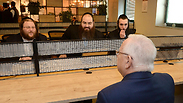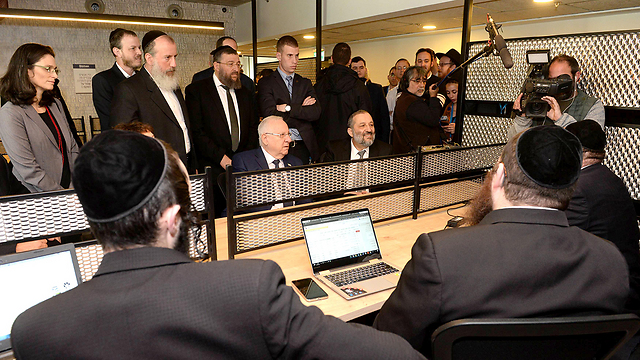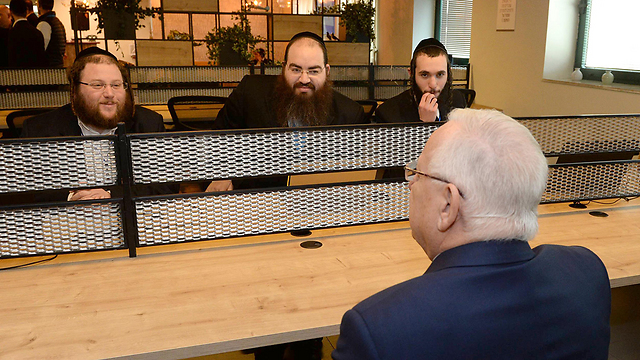
Rivlin at the center
צילום: מארק ניימן, לע"מ
Rivlin, Deri inaugurate Haredi business hub in Jerusalem
The Bizmax Business Center for Innovation, near the capital's central bus station, seeks to integrate more Haredi men into the workforce; the president calls this 'a national priority of the highest level.'
President Reuven Rivlin said Thursday that rising numbers of ultra-Orthodox men who are joining the work force is a "special blessing" for the State of Israel and called on employers not to discriminate against Haredi men seeking employment.
The president said that the integration of Haredi men into the workforce "is a national priority of the highest level."
Speaking at the ceremonial opening of the Bizmax Business Center for Innovation, a co-working hub near the Jerusalem central bus station, Rivlin joined Interior Minister Rabbi Aryeh Deri, Governor of the Bank of Israel Dr. Karnit Flug, Chief Rabbi David Lau and a slew of Haredi business leaders and local politicians who toured the center and celebrated what some called a "landmark achievement" for the community.

President Rivlin (C) with Interior Minister Deri at his left at the center (Photo: Mark Neiman/GPO) (צילום: מארק ניימן, לע"מ)
There is an unmistakable sense of enthusiasm and pride, both amongst individuals who use the center and financial and political backers. CEO Yitzik Crombie balked when asked how much the center cost to build, but it is clearly a lot. With funding from the Kemach Foundation for Haredi profesional development and Achim Global, non-profit that provides business loans, professional and mentoring for Haredi entrepreneurs, the center is impressive and modern, with 15-20 small and mid-sized offices, conference rooms with mounted computer screens, a 200-seat theater, open-plan co-working space and a sitting room for informal conversations.
In an obvious nod to the target audience, the sitting room is decked with religious texts, and the motivational posters on the walls include rabbinic legends about the value of dedication and hard work and phrases like "God is the source of all success".
Dr. Gilad Malach, head of IDI's research program on the ultra-Orthodox community in Israel and co-author of the Mat Plan for Ultra-Orthodox Employment, told Tazpit Press Service (TPS) that the center is an important indication of an ongoing process of integration for Haredi society.
"This issue is far bigger than the workplace itself," Malach said. "You see what happened when the president got up to speak, when the Bank of Israel governor spoke. There's a process happening on a social/sociological level, there's something happening here between Haredi society and general Israeli society.
"Part of the reason that the Haredi community has been so distanced from Israeli society has been practical—because they were largely not part of the workforce they really were separated. Their entry into the workforce creates a sense of connection and belonging to Israeli society."
Although many Haredim oppose that process, it appears that the community as a whole has reconciled itself to the realities of finance and economics. Although the current government has rolled back cuts to Kollel (advanced seminaries for married men) students and reinstituted payments, Malach believes that is a blip in time that will eventually be reversed once again. That, in concert with economic and social realities, creates a clear sense of change to many in the community.
"Of course, the Haredi world recognizes and values Torah study as a supreme value and we admire and respect the people who dedicate their lives to study, said Chanoch Hirshovitz, a finance and insurance advisor from the Jerusalem neighborhood of Har Nof. "At the same time, however, you can't ignore financial needs. Yes, there are some people who devote themselves to study, with great dedication and at great personal sacrifice.
"But others want to keep the commandments on one hand, and want to make sure that Torah study is a regular part of their lives, but they have to support their families, many of which are very large."
At the end of the day, the entry of Haredim into the work force is gaining recognition, and not only in Israel. David Quarrey, Britain's ambassador to Israel, attended the launch, praising Israel's technology sector and adding that the Haredi sector is a growing segment of the Israel-Britain economic relationship.
"We have an interest in the strongest possible economic interests between the UK and Israel and we want to be doing business with all sectors of society in Israel," Quarrey told TPS. "After a year and a half here I feel there is great economic potential in the Haredi community here and I think we should be part of that story."
Article reprinted with permission from TPS











